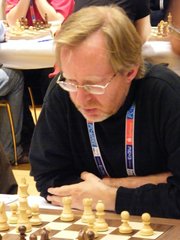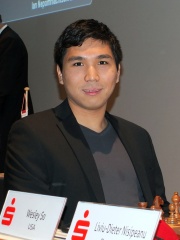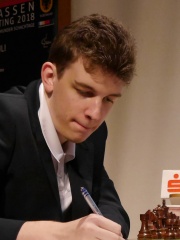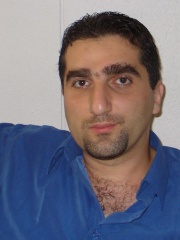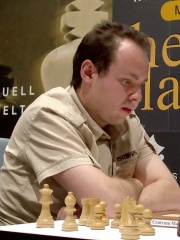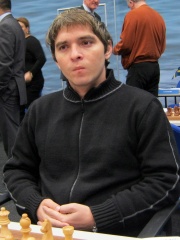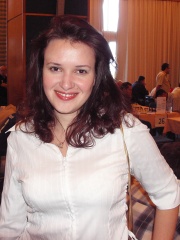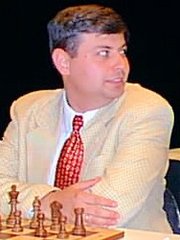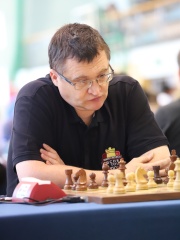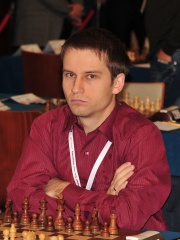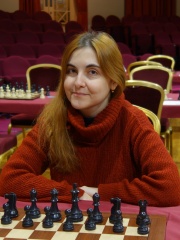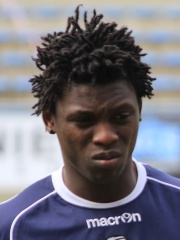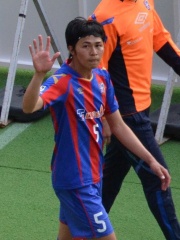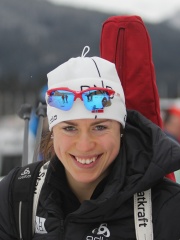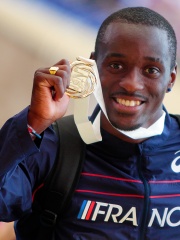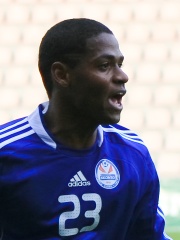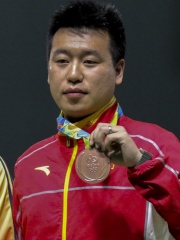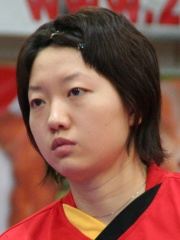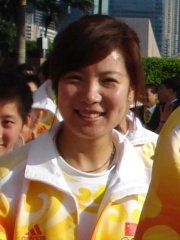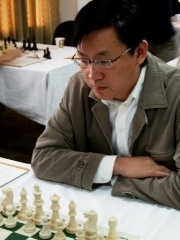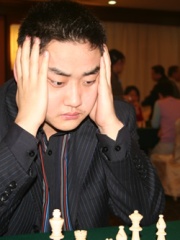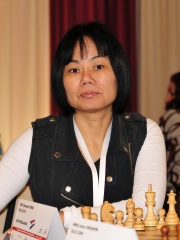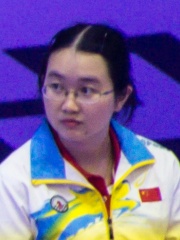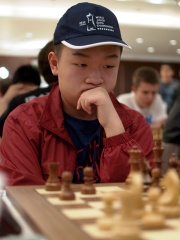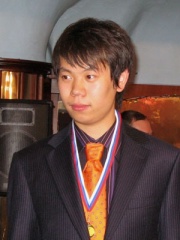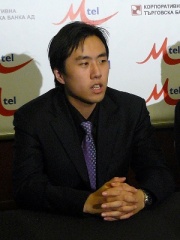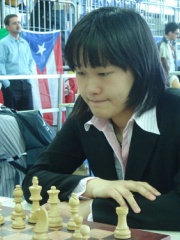Chess Player
Li Chao
1989 - today
EN.WIKIPEDIA PAGE VIEWS (PV)
 Li Chao
Li Chao
Li Chao (Chinese: 李超; pinyin: Lǐ Chāo; born 21 April 1989 in Taiyuan, Shanxi) is a Chinese chess Grandmaster and Asian champion in 2013. In 2007, he became China's 23rd Grandmaster at the age of 18. He has been a second/assistant for fellow Chinese chess Grandmaster Wang Yue on several occasions; the two are good friends having known each other since they were children. In chess circles he is sometimes known as "Li Chao b" since there is another Chinese chess player named Li Chao. Read more on Wikipedia
His biography is available in 18 different languages on Wikipedia. Li Chao is the 373rd most popular chess player (up from 456th in 2024), the 1,387th most popular biography from China (up from 1,672nd in 2019) and the 13th most popular Chinese Chess Player.
Memorability Metrics
Page views of Li Chao by language
Among Chess Players
Among chess players, Li Chao ranks 373 out of 461. Before him are Murray Chandler, Wesley So, Jan-Krzysztof Duda, Ashot Nadanian, Evgeniy Najer, and Lázaro Bruzón. After him are Anna Zatonskih, Boris Alterman, Boris Chatalbashev, Alexei Fedorov, Andrei Volokitin, and Ana Matnadze.
Most Popular Chess Players in Wikipedia
Go to all RankingsMurray Chandler
1960 - Present
HPI: 41.74
Rank: 367
Wesley So
1993 - Present
HPI: 41.72
Rank: 368
Jan-Krzysztof Duda
1998 - Present
HPI: 41.71
Rank: 369
Ashot Nadanian
1972 - Present
HPI: 41.61
Rank: 370
Evgeniy Najer
1977 - Present
HPI: 41.60
Rank: 371
Lázaro Bruzón
1982 - Present
HPI: 41.52
Rank: 372
Li Chao
1989 - Present
HPI: 41.38
Rank: 373
Anna Zatonskih
1978 - Present
HPI: 41.29
Rank: 374
Boris Alterman
1970 - Present
HPI: 41.20
Rank: 375
Boris Chatalbashev
1974 - Present
HPI: 41.07
Rank: 376
Alexei Fedorov
1972 - Present
HPI: 40.98
Rank: 377
Andrei Volokitin
1986 - Present
HPI: 40.98
Rank: 378
Ana Matnadze
1983 - Present
HPI: 40.93
Rank: 379
Contemporaries
Among people born in 1989, Li Chao ranks 697. Before him are Lamine Gassama, Justin Holiday, Matthew Beard, Jānis Strēlnieks, Ryan Bailey, and Saša Čađo. After him are Yuichi Maruyama, Synnøve Solemdal, Teddy Tamgho, Jakub Sylvestr, George Hotz, and Nathan Júnior.
Others Born in 1989
Go to all RankingsLamine Gassama
SOCCER PLAYER
1989 - Present
HPI: 41.44
Rank: 691
Justin Holiday
BASKETBALL PLAYER
1989 - Present
HPI: 41.43
Rank: 692
Matthew Beard
ACTOR
1989 - Present
HPI: 41.43
Rank: 693
Jānis Strēlnieks
BASKETBALL PLAYER
1989 - Present
HPI: 41.40
Rank: 694
Ryan Bailey
ATHLETE
1989 - Present
HPI: 41.38
Rank: 695
Saša Čađo
BASKETBALL PLAYER
1989 - Present
HPI: 41.38
Rank: 696
Li Chao
CHESS PLAYER
1989 - Present
HPI: 41.38
Rank: 697
Yuichi Maruyama
SOCCER PLAYER
1989 - Present
HPI: 41.34
Rank: 698
Synnøve Solemdal
ATHLETE
1989 - Present
HPI: 41.31
Rank: 699
Teddy Tamgho
ATHLETE
1989 - Present
HPI: 41.31
Rank: 700
Jakub Sylvestr
SOCCER PLAYER
1989 - Present
HPI: 41.30
Rank: 701
George Hotz
INVENTOR
1989 - Present
HPI: 41.26
Rank: 702
Nathan Júnior
SOCCER PLAYER
1989 - Present
HPI: 41.25
Rank: 703
In China
Among people born in China, Li Chao ranks 1,387 out of NaN. Before him are Jackson Yee (2000), Zeng Cheng (1987), Xu Lili (1988), Pang Wei (1986), Zhang Xiangxiang (1983), and Ji Xinpeng (1977). After him are Liu Yuxiang (1975), Pablo Herrera (null), Zhuang Yong (1972), Li Jiawei (1981), Yang Xiuli (1983), and Du Li (1982).
Others born in China
Go to all RankingsJackson Yee
ACTOR
2000 - Present
HPI: 41.46
Rank: 1,381
Zeng Cheng
SOCCER PLAYER
1987 - Present
HPI: 41.44
Rank: 1,382
Xu Lili
ATHLETE
1988 - Present
HPI: 41.44
Rank: 1,383
Pang Wei
ATHLETE
1986 - Present
HPI: 41.43
Rank: 1,384
Zhang Xiangxiang
ATHLETE
1983 - Present
HPI: 41.43
Rank: 1,385
Ji Xinpeng
BADMINTON PLAYER
1977 - Present
HPI: 41.41
Rank: 1,386
Li Chao
CHESS PLAYER
1989 - Present
HPI: 41.38
Rank: 1,387
Liu Yuxiang
ATHLETE
1975 - Present
HPI: 41.36
Rank: 1,388
Pablo Herrera
ATHLETE
HPI: 41.36
Rank: 1,389
Zhuang Yong
SWIMMER
1972 - Present
HPI: 41.31
Rank: 1,390
Li Jiawei
TABLE TENNIS PLAYER
1981 - Present
HPI: 41.31
Rank: 1,391
Yang Xiuli
WRESTLER
1983 - Present
HPI: 41.29
Rank: 1,392
Du Li
ATHLETE
1982 - Present
HPI: 41.25
Rank: 1,393
Among Chess Players In China
Among chess players born in China, Li Chao ranks 13. Before him are Ye Jiangchuan (1960), Wang Yue (1987), Qin Kanying (1974), Peng Zhaoqin (1968), Tan Zhongyi (1991), and Zhang Zhong (1978). After him are Wei Yi (1999), Wang Hao (1989), Bu Xiangzhi (1985), Zhao Xue (1985), Ni Hua (1983), and Ruan Lufei (1987).
Ye Jiangchuan
1960 - Present
HPI: 44.85
Rank: 7
Wang Yue
1987 - Present
HPI: 44.79
Rank: 8
Qin Kanying
1974 - Present
HPI: 43.82
Rank: 9
Peng Zhaoqin
1968 - Present
HPI: 43.29
Rank: 10
Tan Zhongyi
1991 - Present
HPI: 43.12
Rank: 11
Zhang Zhong
1978 - Present
HPI: 43.09
Rank: 12
Li Chao
1989 - Present
HPI: 41.38
Rank: 13
Wei Yi
1999 - Present
HPI: 40.53
Rank: 14
Wang Hao
1989 - Present
HPI: 40.42
Rank: 15
Bu Xiangzhi
1985 - Present
HPI: 39.01
Rank: 16
Zhao Xue
1985 - Present
HPI: 37.12
Rank: 17
Ni Hua
1983 - Present
HPI: 37.06
Rank: 18
Ruan Lufei
1987 - Present
HPI: 36.46
Rank: 19

